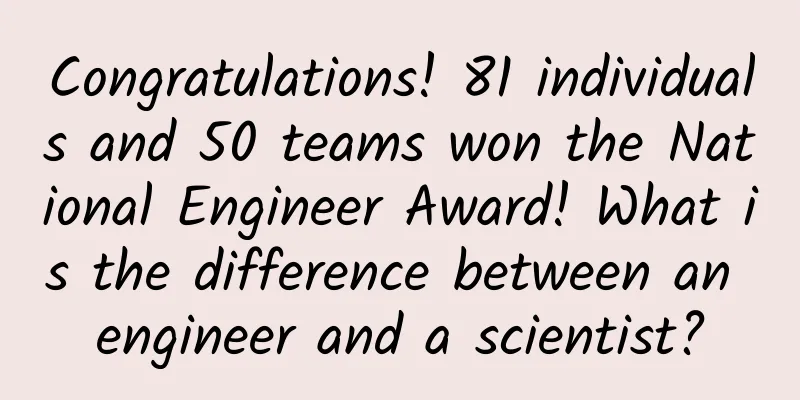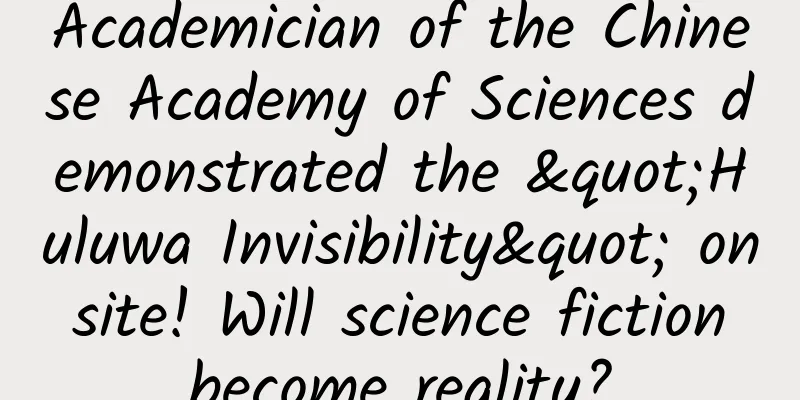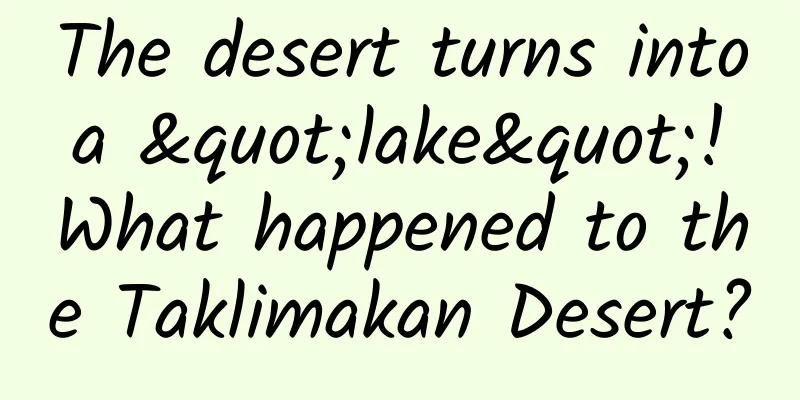Congratulations! 81 individuals and 50 teams won the National Engineer Award! What is the difference between an engineer and a scientist?

|
Congratulations! 81 individuals and 50 teams won the National Engineer Award! What is the difference between an engineer and a scientist? This morning, the "National Engineer Award Commendation Conference" was held in the Great Hall of the People. 81 individuals were awarded the title of "National Outstanding Engineer" and 50 teams were awarded the title of "National Outstanding Engineer Team". Image source: News screenshot So what is an "engineer"? What is the difference between the two titles "engineer" and "scientist"? In daily life, many people think that scientists and engineers are people who deal with science and knowledge, and there is no difference. But in fact, these two titles are different. For example, we read about Edison, the Wright brothers, Watt and others in many collections of scientists' stories. Strictly speaking, they cannot be regarded as scientists. It may be more appropriate to call them "engineers". Scientists “less than 200 years old” First, let's look at "scientists". In the Modern Chinese Dictionary, scientists are defined as "people who have achieved certain success in scientific research". And "science" is "a knowledge system of disciplines that reflects objective laws of nature, society, thought, etc." In this way, scientists can be described as "people who study objective laws and knowledge systems of nature, society, thought, etc., and have achieved certain success in them." In the English-speaking world, Merriam-Webster's dictionary defines the word "scientist" as "a person learned in the field of scientific knowledge, especially the natural sciences." According to this definition, in the past thousands of years of human history, the masters and scientific researchers who explored the laws of nature and tried to establish a systematic knowledge system from the laws can certainly be called scientists. For example, Archimedes summarized and discovered the law of buoyancy, Mozi summarized the law of pinhole imaging, Newton pioneered mechanics and optics, and Maxwell established the theory of electromagnetic field. Interestingly, the identity of scientist has a history of thousands of years, but the word "scientist" has a history of less than 200 years. Its emergence is related to William Whewell, a British polymath, philosopher and historian of science. Whewell was a mathematician who had made great achievements in physics, geology and chemistry, but he seemed to have difficulty finding a clear word to describe who he was. Whewell also found that this was not a problem only for him. As people explored the world more and more, many scholars at that time encountered such problems. So, in 1834, Whewell published an article in The Quarterly Review, using the word scientist for the first time. Some experts in the history of science and technology also believe that in 1833, at a meeting of the British Association for the Advancement of Science in Cambridge, Whewell invented the word scientist after the word artist. Sewell's point is that the scientific world is increasingly fragmented, and it is difficult to find a unified word to refer to the group doing scientific research. Mathematicians are mathematicians, and chemists are just chemists. Students at Cambridge and Oxford find it difficult to find a word to describe what they are pursuing. At the time, people would use the word "philosopher" to describe this group of researchers, but this word was too broad and sounded too noble, so Sewell suggested using the word scientist to describe those who were engaged in research in the fields of science and economics. However, his article did not attract much attention. Fortunately, Sewell did not give up. In 1840, Whewell again published an article calling for the use of this word. After that, the word "scientist" began to become widely popular in Britain and the United States. This word is indeed very convenient to use. Take Newton as an example. If we don't say that he is a scientist, we must use the expression "physicist + natural philosopher + economist + astronomer" to summarize most of his contributions. Copyright images in the gallery. Reprinting and using them may lead to copyright disputes. Engineers are not called what they want Next, let’s take a look at engineers. Let's start with the Modern Chinese Dictionary. The Modern Chinese Dictionary defines engineer as "one of the job titles of technical cadres, a specialist who can independently complete the design and construction of a specific technical task." According to this statement, "engineer" is a special title, and only those who have obtained the title of engineer can be called engineers. From this we can see that, whether in China or Western countries, people who have not undergone systematic study and training, or have not obtained the title of engineer, cannot be casually called "engineers." However, if we strictly follow this definition, we will encounter a problem. For example, a professor or researcher, whose job title sequence is not an engineer, may be responsible for designing and building an engineering project. In this case, he may also be called an engineer. In addition, it is obviously impossible for the people who were responsible for designing and building the pyramids and Dujiangyan in ancient times to have a professional title, but we still call them engineers. This title can be regarded as engineers in a broad sense. Scientists and engineers may indeed overlap Of course, the identities of scientists and engineers are not absolute. After exploring and studying scientific laws, scientists may personally apply these laws and participate in engineering projects. For example, Qian Xuesen, the famous hero of the "two bombs and one satellite", was undoubtedly a scientist when he studied aerodynamics and explored the laws of air flow. And when he used this knowledge to build missiles and rockets for China, he was an engineer. Therefore, Qian Xuesen is not only an academician of the Chinese Academy of Sciences, but also an academician of the Chinese Academy of Engineering. When engineers solve practical problems, they may also need to explore and summarize the laws of the objective world. In this process, they may transform themselves into scientists. For example, Claude Shannon, the founder of information theory. He was originally an electrical engineer who used physics and mathematics to improve the fire control system of weapons and solve the problem of encrypted information transmission. In the process of solving these problems, Shannon summarized a systematic mathematical theory and laid the foundation for information theory. Perhaps it is precisely because there is a certain degree of overlap in the identities of some scientists and engineers that people misuse or confuse the two concepts. Copyright images in the gallery. Reprinting and using them may lead to copyright disputes. How do scientists and engineers distinguish themselves? In fact, many scientists and engineers have discussed the differences between "scientists" and "engineers" or "science" and "engineering" among themselves. This is not to say that scientists have nothing to do with the future world. What von Karman meant was that scientists need to explore the laws and knowledge of the world from the existing world, and the important thing is the process of "research", while engineers need to use knowledge to create things that can change our lives, and the important thing is the process of "creation". Zhou Guangzhao, a physicist who once served as the president of the Chinese Academy of Sciences, also mentioned the difference between "science" and "engineering". He believes that science is "created by humans in the process of understanding and transforming the world. It is a systematic theoretical knowledge that correctly reflects the phenomena of the objective world, the internal structure of matter and the laws of motion. The content of scientific theory must conform to objective reality, be logically rigorous, have no contradictions, and be able to guide practice." Engineering is "human organized and comprehensive use of multiple scientific and technological activities to transform the world on a large scale. In addition to considering the advancement and feasibility of technology, it also considers cost and quality, and is economical, practical, and beautiful. It also considers the impact on the environment to avoid pollution." To put it simply, the task of scientists is to find laws, and engineers use these laws to transform the world. Of course, although there are differences between the titles of scientists and engineers, in real life, scientists and engineers often need to work together to better change the world. References [1] Sydney Ross, "Scientist: the story of a word," Annals of Science, vol. 18, no. 2 (June, 1962), pp. 65-85. [2] Christensen, Steen Hyldgaard; Christelle Didier, Andrew Jamison, Martin Meganck, Carl Mitcham, and Byron Newberry Springer. Engineering Identities, Epistemologies, and Values: Engineering Education and Practice in Context, Volume 2, p. 170 [3] Modern Chinese Dictionary (7th edition) [4] Merriam-Webster Dictionary (online version) [5] http://www.kmcenter.org/zhongkeyuanyuanzhang-kexue-jishu-gongcheng/ Planning and production This article is a work of Science Popularization China-Starry Sky Project Produced by: Science Popularization Department of China Association for Science and Technology Producer|China Science and Technology Press Co., Ltd., Beijing Zhongke Xinghe Culture Media Co., Ltd. Author: Science Scraps Popular Science Team Review丨Wang Hongpeng, Associate Researcher, China Science and Technology Museum Planning丨Xu Lai Editor: Xu Lai and Zhong Yanping |
Recommend
The most comprehensive guide to placing Toutiao search ads!
ByteDance has been continuously developing its se...
The road is slippery on snowy days. Here is a biomechanical guide to help you fall properly.
Heavy snow has fallen across the northern part of...
Tik Tok recommendation mechanism and traffic distribution strategy
As the system streaming algorithm changes, many l...
Do you agree that AirPods is Apple’s new chess piece in its Internet of Things layout?
Perhaps the biggest complaint about the new gener...
Three major updates to Apple's Core ML framework in 2020: more layer types, model encryption, and CloudKit-based model deployment
This year's Apple WWDC Global Developer Confe...
How much does it cost to make a Tik Tok mini program? How much does it cost to develop a mini program for Douyin?
If we talk about the hottest platform now, it mus...
Public account disk says "Swordsman" teaching video
Public account Panmian said "Swordsman"...
Ten thousand words of dry goods summary: the most comprehensive interpretation of operational data indicators
Operations and data analysis are inseparable. Bus...
US confidential intelligence leaked again: there may be a "second Snowden"
Beijing time, August 6, morning news, according t...
CTIA: 2022 U.S. Wireless Network Industry Survey Report
The U.S. wireless industry invested nearly $ 35 b...
I didn’t smell the “bloody wind”, but I really saw the “bloody rain”! How could it be “bloody rain”?
Author: Huang Xianghong Duan Yuechu Throughout th...
LePar helps traditional channels transform into service providers
How to let users experience the product in a real ...
WeChat Mini Program Operation, How to Improve Mini Program Retention Rate?
Although mini programs have fission capabilities ...
China Automobile Dealers Association: Comparison of used car business of Chinese and American 4S stores
The 2020 Annual Meeting of the Second-Hand Car Br...









